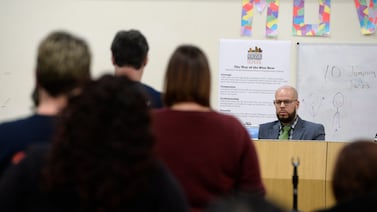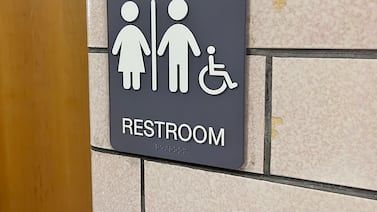Sign up for Chalkbeat New York’s free daily newsletter to keep up with NYC’s public schools.
Some New York children are already receiving summer food benefits as part of a new federal program rolling out this year, but hundreds of thousands of eligible families still have yet to apply, Gov. Kathy Hochul said Thursday.
So far, the state has issued nearly $200 million in benefits to more than 1.5 million children through the new Summer EBT program, with eligible families receiving $120 per child. Some families have already received the funds, while others will see them arrive in the coming weeks, according to state officials.
“No child should ever, ever go hungry because the cost of living was just too damn high for their parents and their families,” Hochul said during a Thursday press conference on the Lower East Side. “My jaw drops when I see the cost of groceries right here in our city and across the state of New York.”
The new benefits follow a similar federal program that began during the COVID pandemic and operated for several years, intending to help cover costs for meals usually provided at school. But though advocates described that program as a lifeline for families in need, some New Yorkers never redeemed their benefits, and millions of dollars in potential aid were routinely left on the table. Some critics blamed the unused funds on insufficient state outreach.
There are also key differences between the two programs. All New York City public school families received the pandemic-era benefits, but a smaller number of families are eligible under Summer EBT. Some New York City families will also have to apply in order to receive them — a potential barrier for those who may be unaware of the requirement.
“Here’s the issue: there are still hundreds of thousands of kids who are eligible, and their parents have not taken advantage of this,” Hochul said.
State officials estimate roughly 2 million children across the state are eligible for the benefits.
Families have just weeks left to apply to the program. Here’s what New York City families need to know:
Who is eligible
Under federal guidelines, a child is only eligible for the program if they attend a school with free lunch and meet household income requirements for free- or reduced-price school meals. (The income requirement varies based on household size, and families can check whether they are eligible here. A family of four, for example, would qualify with an annual income at or below $57,720.)
How to apply
Most eligible families, including recipients of SNAP, Temporary Assistance, or Medicaid, will automatically receive the funds. Those who will automatically receive them will be notified via a letter, state officials said.
Others will need to apply. Families can access the online application here, and must apply by Sept. 3.
When do benefits expire
Summer EBT funds will expire 122 days after they are issued.
Julian Shen-Berro is a reporter covering New York City. Contact him at jshen-berro@chalkbeat.org.






